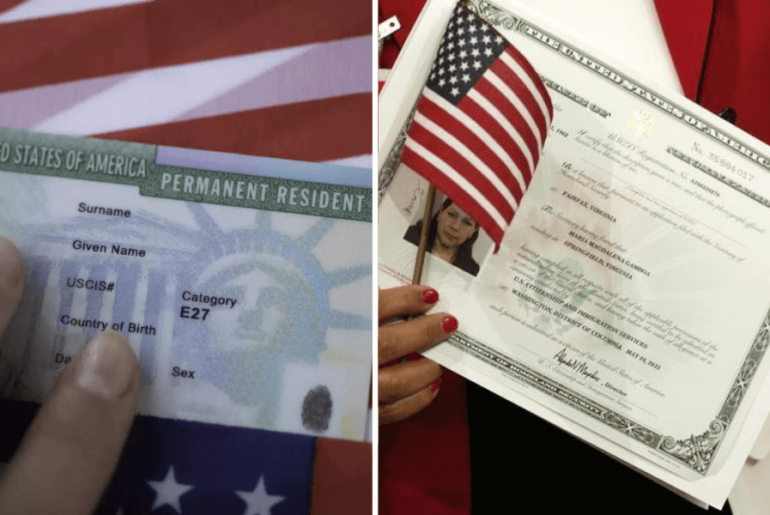Did you know that obtaining a ‘Green Card’ does not mean becoming a U.S. citizen? Often, many people use the terms “Permanent Resident/Green Card holder” and “Citizen” interchangeably, even though there is a significant difference between the two statuses. If you are wondering about the differences and similarities between the two, keep reading this article as we will share the most important ones.
Next, I am going to answer the following questions:
- What is a Permanent Resident?
- What are my rights and benefits as a Permanent Resident?
- Who is considered a U.S. citizen?
- What are my rights and responsibilities as a U.S. citizen?
- What’s the difference between a Permanent Resident and a U.S. citizen?
- What resources are available to learn more about citizenship and permanent residency?
What is a Permanent Resident?
Lawful permanent residents (LPRs), also known as “green card” holders, are people who are lawfully authorized to live permanently within the United States. After a specific duration (usually 5 years), all permanent residents are eligible to apply for U.S. citizenship through a “naturalization” process. To become a naturalized U.S. citizen, you must show good moral character during your time as a permanent resident and pass an exam on U.S. history and government.
Who is considered a U.S. citizen?
A person may become a United States citizen by birth or through naturalization. If you were born anywhere in the United States or its territories, you are a U.S. citizen.In addition, you are eligible for “derived citizenship” if you were born abroad but one of your parents was a lawful U.S. citizen at the time of birth.
Citizenship through naturalization is when individuals born in a foreign country and then immigrate to the U.S. apply for U.S. citizenship after acquiring permanent resident status. If approved by the proper authorities, they become naturalized citizens.
U.S. citizenship is the highest status someone can attain under U.S. immigration law. It means a truly permanent right to live in the United States. Citizens are not subject to the deportation rules that affect green card holders. The only way someone can take a former immigrant’s citizenship away is if that person committed fraud in obtaining it in the first place.
What’s the difference between a Permanent Resident and a U.S. citizen?
While both permanent residents and citizens enjoy much freedom over other immigrants and visa holders, there is a broad distinction between the two. The most notable differences fall into these five categories:
- Traveling with a U.S. Passport
- Protection from Deportation
- Family-Based Immigration
- Voting Rights
- Employment
Traveling with a U.S. Passport
A U.S. citizen is eligible to receive a U.S. passport and can leave and reenter the U.S. at any time without restrictions on the number of days they can remain outside the United States.
Permanent residents can travel outside the U.S., but cannot obtain a U.S. passport. They also have more travel restrictions, such as needing an unexpired green card to reenter the U.S. and not being able to spend more than 12 consecutive months outside of the U.S. without being considered to have abandoned their residence and given up their green card. If you plan on traveling outside of the U.S. for more than a year, you may be able to apply for a re-entry permit before you travel.
Protection from Deportation
One of the key differences between permanent residency and citizenship is whether or not you can get deported. Permanent residents can still be deported for committing crimes such as forgery of documents, terrorist activity, espionage, and general conduct interpreted as a threat to national security.
U.S. citizens are not subject to the grounds of deportability that affect green card holders.
Family-Based Immigration
Permanent residents can petition for immediate family members, which only includes spouses and unmarried children. These two family-based categories have limited visas available per year. U.S. citizens can petition for parents, spouses, children (married or not), and siblings. Fewer annual limitations apply, so the timeline is usually faster for citizens.
Voting Rights
U.S. citizens may vote in local, state, and federal elections. Permanent residents cannot vote in U.S. elections. Doing so could be considered a false claim to U.S. citizenship and get you deported.
Employment
Both permanent residents and citizens have the right to work in the U.S. However, citizens have more job opportunities than permanent residents. Being a citizen opens up career opportunities, such as working for federal and government agencies that are unavailable to permanent residents.
What resources are available to learn more about citizenship and permanent residency?
The U.S. Citizenship and Immigration Services (USCIS) site has many resources regarding everything you need to know about citizenship and residency. A few are linked below:

